Stanley Kubrick 6: Odd Man Out – Barry Lyndon (1975)
My project of revisiting all of Stanley Kubrick’s movies in chronological order has, once again, been stalled for some time, although the delay in looking at Barry Lyndon again has nothing to do with the kind of reluctance I felt with Spartacus. Rather, it’s just been difficult to find a clear window of three-plus hours to devote to the kind of focused viewing it deserves. But finally, with the editing on my documentary almost complete, I did recently have an afternoon when I could relax and immerse myself in the film’s richly imagined world.
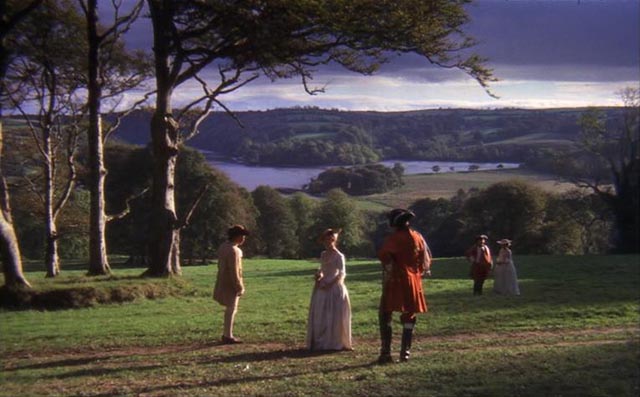
I didn’t set out deliberately to become a contrarian, but somehow it happened along the way. My tastes and interests have been out of sync with mainstream opinion for as long as I can remember – rather aggressively so when I was younger: in my teens and twenties I used to argue a lot with other people about books and movies. The day after my negative review of The Deerhunter appeared in the university paper, a woman confronted me in a hallway and demanded to know who the hell I thought I was not to agree with everyone else that it was a masterpiece … But I can’t be the only one who thinks that The Dark Knight Rises is a torturously dire piece of rubbish.
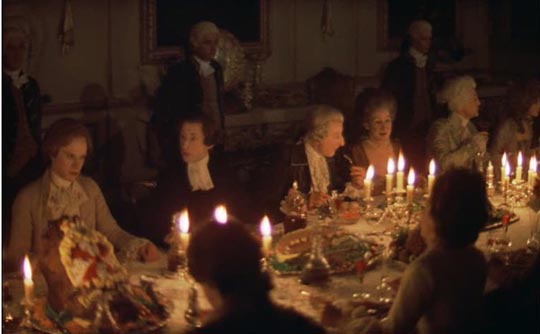
And even today, I’d rather watch Tobe Hooper’s Lifeforce again than George Lucas’ Star Wars. In fact, I did re-watch it a few weeks ago and enjoyed it as much as I did the first time I saw it in 1985, and not just because I’d briefly been on the set in London back in 1984 when I went to visit John Dykstra, who was in charge of the effects. I stopped by to say hello because I’d met and liked John the previous year when he was initially in charge of the effects on David Lynch’s Dune, before he finally pulled out because of Dino De Laurentiis’ constant undermining of the effects budget.
All of which is merely preamble to my assertion that Barry Lyndon is Stanley Kubrick’s greatest film, obviously a minority opinion. This richly imagined historical epic remains a kind of orphan in his filmography, as is evident from the fact that in the otherwise excellent Kubrick Blu-ray box set, it’s the only film which is entirely devoid of supplementary materials, even though there surely must be a lot to say about the production and, from a critical angle, the film itself.
Barry Lyndon (1975)
For several decades, Kubrick’s dream project was a film about Napoleon which he did an enormous amount of work on (much of it available in Taschen’s awkward Stanley Kubrick’s Napoleon: The Greatest Movie Never Made [edited by Alison Castle, 2009], which includes a draft of the script, extensive notes and an overwhelming quantity of the visual materials Kubrick accumulated over the years, with links to a vast on-line library of images). Despite the special relationship that Kubrick had with his backers at Warner Brothers, that project always remained financially out of reach, so in a way to some degree Barry Lyndon represents a sketch in stylistic terms of what he might have had in mind for that project.
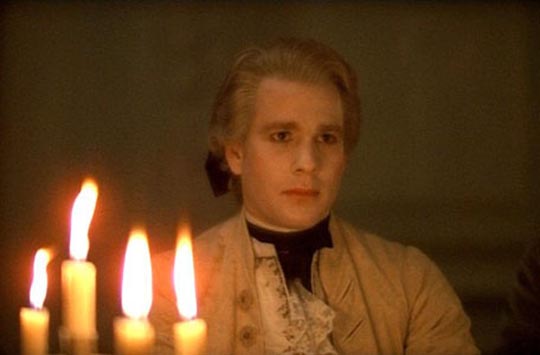
It’s not surprising that Kubrick found an affinity with William Thackeray’s novel; he shared with the 19th Century writer an acerbic view of human nature and social relationships which enabled him to combine his interest in the historical period with an entirely contemporary attitude towards the story and characters. The novel is narrated by Barry himself, but Kubrick’s adaptation creates a slight distance from the unreliable character by using a third-person narrator who observes the action and drily comments on events; this of course is more in tune with Kubrick’s own penchant for detached observation.
Kubrick’s rich evocation of 18th Century Europe illuminates the strong connection that exists between historical fiction and science fiction, the imaginative creation of an alien world in order to comment on the present, and there has seldom been such a convincingly detailed depiction of the past on screen (the only film I can think of that creates a comparable sense of past reality is Kevin Brownlow and Andrew Mollo’s brilliant Winstanley [1976]).
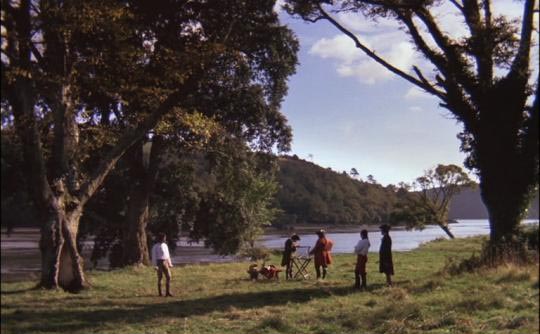
Thackerary’s picaresque narrative affords Kubrick the opportunity to make Redmond Barry (Ryan O’Neal), a naive and passionate young Irishman, the perfect exemplar of the director’s view of flawed humanity. Adolescent passion for his cousin Nora Brady (Gay Hamilon) causes Barry to make a fool of himself when she becomes engaged to a pompous British officer, Captain John Quin (Leonard Rossiter). Despite the family’s wishes (and their urgent need of the annual income the match will bring), Barry challenges Quin to a duel. With the captain apparently shot dead, Barry flees to Dublin and, robbed by polite highwaymen along the way, begins a series of adventures in which he is tossed about by fate.
Joining the King’s army, he goes to fight in Europe, but his first experience of the madness of battle (a line of soldiers in bright red uniforms marching stoically into the enemy’s guns almost certainly to their deaths) causes him to desert. Assuming the identity of an officer, he ends up in the company of the Prussian Captain Potzdorf (Hardy Kruger), who gives him the choice of execution for desertion or spying on a dubious Irish lord, the Chevalier de Balibari (Patrick Magee). Homesick, Barry falls in with the man he’s supposed to spy on and escapes the country.
At a spa, he courts Lady Lyndon (Marisa Berenson), the wealthy wife of an ailing aristocrat, eventually marrying her after the man’s death. Up until this point, Barry has been a roguish, if generally contingent, hero; luck and wiles have enabled him to survive and gradually work his way up the social ladder despite his humble origins. Kubrick manages to draw an engaging performance out of O’Neal and the viewer takes pleasure in seeing him succeed and finally, it seems, gain the social position he has longed for. This is the director’s quintessential portrait of the individual as a limited agent adrift in a universe of forces generally beyond his control or comprehension, the abstract notion of humanity we see in 2001: A Space Odyssey embodied in a single individual.
But in the second half of the film, the very characteristics which have sustained Barry are revealed to be the source of his downfall. Although the character remains the same, the desires that drive him now result in destructive, even vicious behaviour. What he has wanted all along is social position and this he has gained; but he has no real interest in the pale Lady Lyndon and certainly no liking for her son, Lord Bullingdon (Leon Vitali). He depletes the family’s fortune, brings his opportunistic mother (Marie Kean) from Ireland to run the household, and focuses all his emotional energies on his own young son, Bryan (David Morley). What had seemed charming in Barry as he fought his way through the world is now exposed as selfish, even cruel, material gain displacing almost all other emotional and social needs.
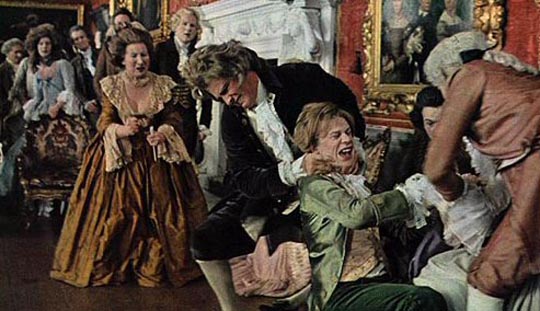
However, Barry’s inability to play the social game correctly, to manifest the proper nuances of behaviour, brings about his inevitable downfall. Money alone can’t make the Irish boy an English gentleman (not that a gentleman is necessarily any less unpleasant; the ageing Sir Charles Lyndon [Frank Middlemass] was a drunken boor) and his efforts to buy himself a peerage are undone by the public spectacle of a fight with Lord Bullingdon which exposes Barry’s cruelty to his family.
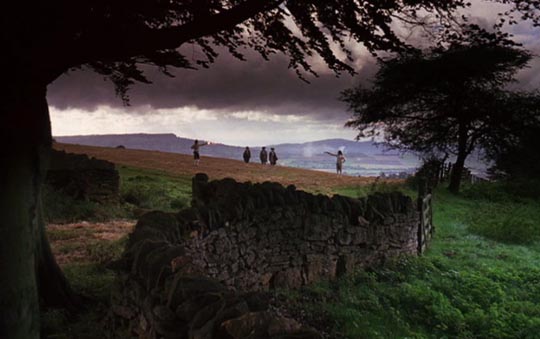
The final act of the film is one of the finest pieces of work Kubrick ever did, and the completion of a device which structures the whole narrative. There are three duels in the film, the first of which is seen in silhouette from a distance – the death of Barry’s father. The second is the duel between Barry and Captain Quin, which we later discover was faked in order to get Barry out of the way so that the marriage of Quin to his cousin can proceed unhindered. This is a brief scene, shot more closely, with Barry’s brashness contrasted with Quin’s nervous fear. These duels illuminate the disparity between the idea of honour and nobility which drives supposedly genteel social behaviour and the senseless and wasteful fact of violent death.
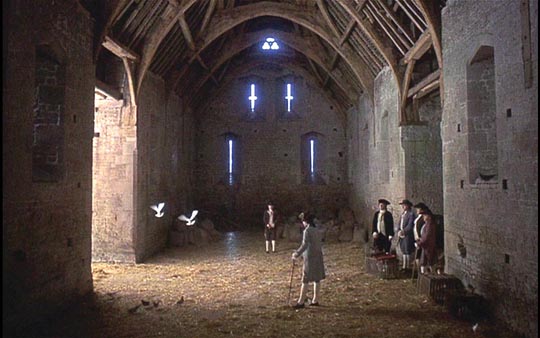
The film’s third and final duel, between Barry and Lord Bullingdon, is one of the richest evocations of emotional nuance in all of Kubrick’s work. The young Bullingdon, driven by outrage at the way his mother has been treated and his own inheritance squandered, is fearful to the point of physical sickness at the prospect of death, while Barry strives to behave as the gentleman he so longs to be, to face the fight with a kind of arrogant confidence. When Bullingdon, having won the toss, gets to make the first shot and his pistol misfires, Barry condescendingly fires into the ground, fully confident that this gesture will put an end to the duel while (not incidentally) indicating his own nobility. But Bullingdon refuses to concede and his second shot shatters Barry’s leg. Left a cripple, he is expelled from the family with a small stipend and forced to leave with his bitter mother to live out his life in obscurity.
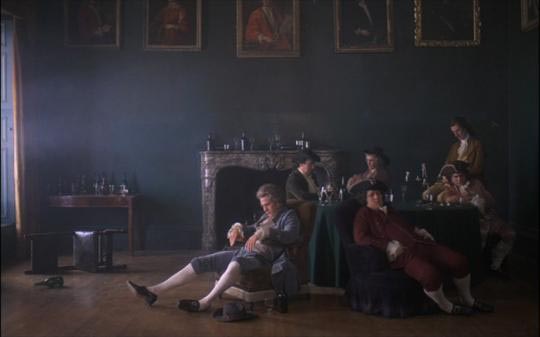
This duel is played out in a kind of slow motion which pushes “real time” to its limits, generating an awful tension which reduces all social interaction to its physical essence – pretension, ambition, moral outrage, everything reduced to the immediate prospect of painful injury or death. As in the film as a whole, we see here Kubrick’s absolute mastery of pace, camerawork, editing and performance.
When I say that I believe Barry Lyndon to be Kubrick’s finest achievement, it’s because of the balance he achieves between the world he creates, the social, cultural and thematic details, and the characters within the narrative. In 2001, the human figures remain ciphers; in A Clockwork Orange, they are exaggerated grotesques embodying the film’s satirical purposes. But Barry and the people he encounters, though some remain mere sketches (like Lady Lyndon), seem like living, breathing human beings and this makes it the most emotionally satisfying of his films, the two scales – human and cosmic – in perfect balance.
Response
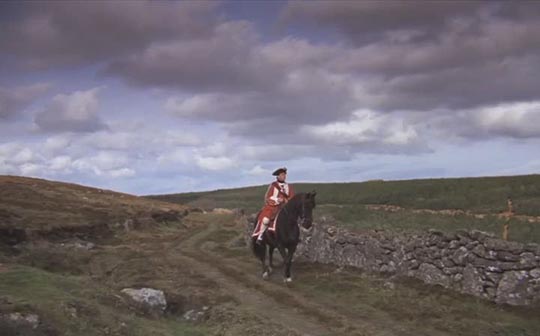
Why Barry Lyndon was not much of a success when released in 1975 probably has many explanations, not the least of which is its length and deliberately slow pace. Visually, the director models his images on paintings from the period which give the film a stately (though never static) grandeur which seems to dwarf the characters. John Alcott’s photography was damned with faint praise by a number of critics (one remarked snidely that although Marisa Berenson is something of a cipher as Lady Lyndon, she looks lovely in candlelight).
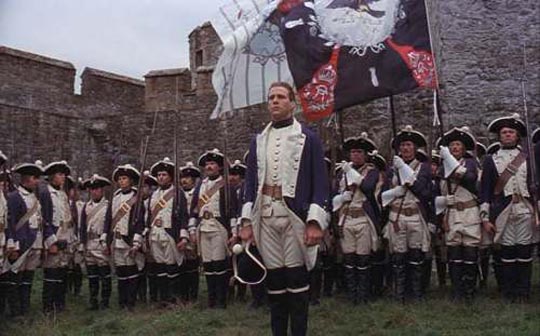
But perhaps the fact that the film came after the genre-defining two-shot of 2001 and A Clockwork Orange caused a certain degree of confused expectation in viewers who had embraced those visions of the future. For myself, as I mentioned above, Barry Lyndon continued that strain of world-creating at which the science fiction films had been so successful. The re-creation of the past was not merely decorative backdrop, but essential to Kubrick’s thematic concerns, the palaces and landscapes of 18th Century Europe akin to the emptiness of space in 2001 and the bleak urban landscape of A Clockwork Orange in establishing human insignificance in the face of an implacable universe.
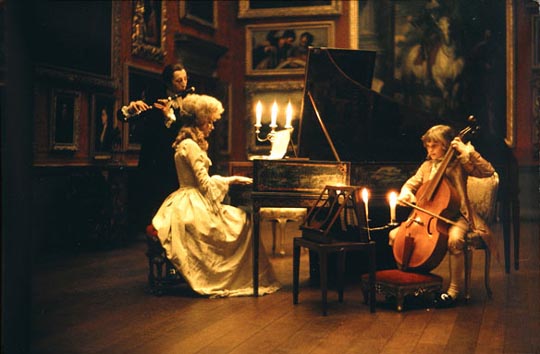
Finally, a note on gender: women throughout Kubrick’s work have a tendency to be symbolic rather than realistic characters – the German girl at the end of Paths of Glory, Lolita, Alex’s victims in A Clockwork Orange. Did Kubrick choose the lesser Barry Lyndon for adaptation rather than Thackeray’s masterpiece Vanity Fair simply because its scale might be more manageable, or was it as much because the protagonist was male rather than female, although there are many similarities between Barry and Becky Sharp?
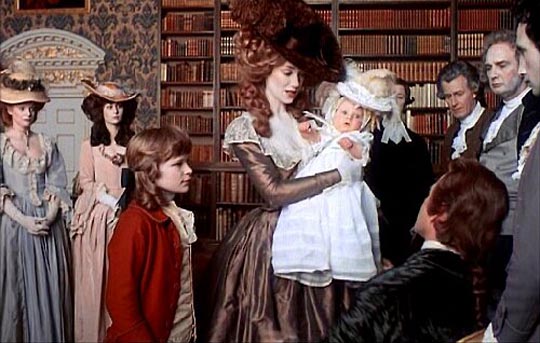
There are four women in Barry’s life and three of them cannot be considered particularly positive emblems of their gender. There’s Barry’s monstrously protective mother; his cousin Nora, who flaunts her sexuality in order to torture the shy and inexperienced boy; and Lady Lyndon, a classically pale and vaporous aristocrat seemingly devoid of any will of her own. Whether this is seen as a weakness in the film or perhaps more accurately as a reflection of Barry’s own view of women is open for debate. His treatment of Lady Lyndon could almost be seen as a kind of revenge for his treatment at the coquettish hands of Nora.
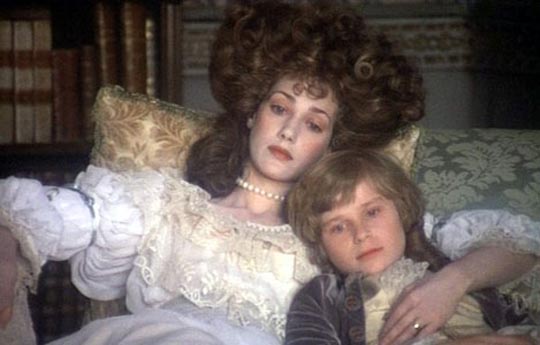
The fourth woman is Lischen (Diana Koerner), a farm wife whose husband has gone off to war, who takes the weary deserter in, offers him food and the comforts of sex, and then sadly watches him ride away as no doubt other men have before him. This is a brief oasis of tenderness in the narrative, but significantly is seen as inevitably transitory. Barry could not settle for the simplicity of this kind of life, but it hangs over the rest of the film and its social complications as a kind of ideal of what might be if we flawed human beings were not driven by our self-destructive urges.
Comments
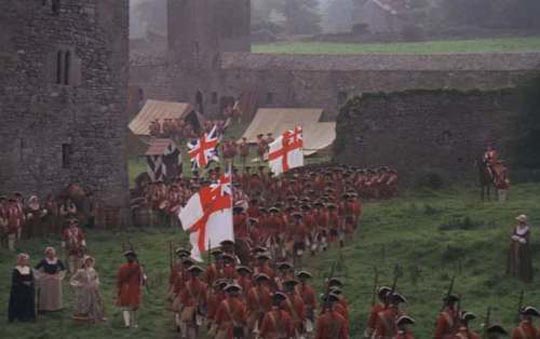
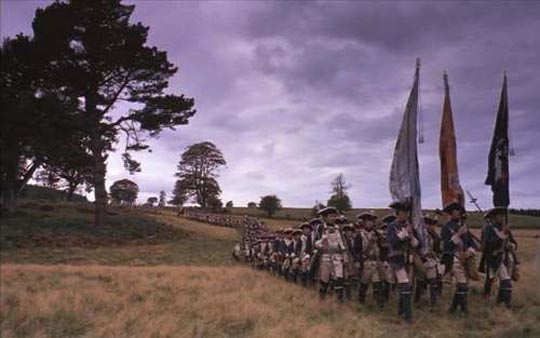
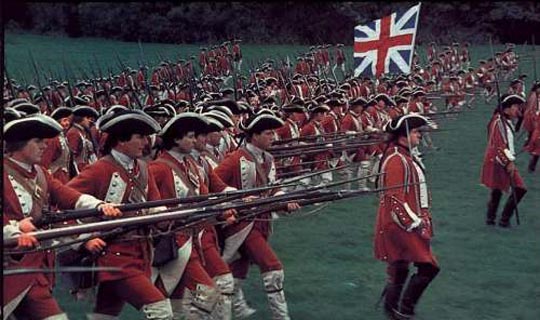
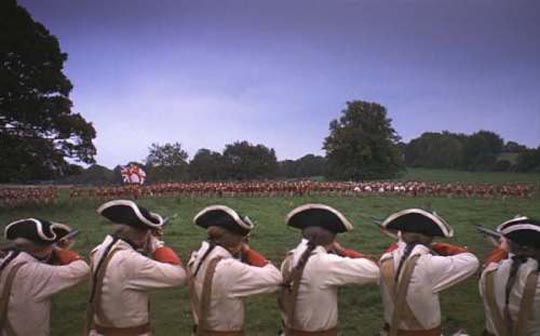
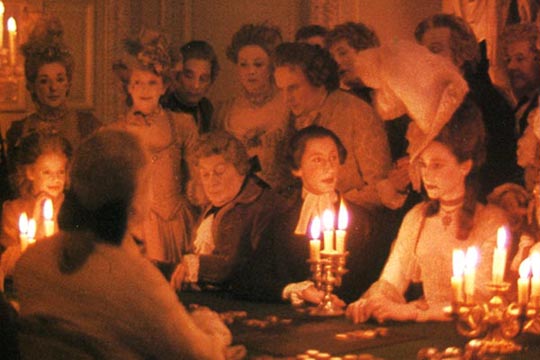
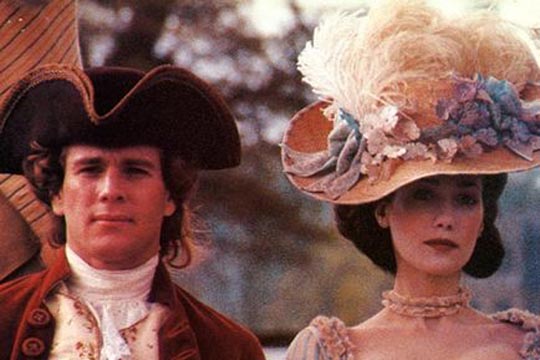
These observations are spot on. Lyndon is Kubrick’s greatest work, a masterpiece beyond measure. It was interesting to observe audience reaction during its first run. They disliked it vigorously. But I remember a screening when a new print was issued for its 25th anniv., and the audience there got it – laughed in all the right places, and thoroughly enjoyed being caught up in the sweep of the story. The only way to truly appreciate Lyndon is see it for what it truly is: a comedy. Once you figure that out, you are on your way to understanding and enjoying a profound film experience.
Almost a year after your post … hope you’re still reading your comments!
Definitely Kubrick’s finest work. Beautifully evocative. The only period piece that leaves you feeling like you are actually in the 18th Century. I’ve always found it odd that commentators complained that the film was cold and emotionally astringent. OR that he lacks sympathy for his characters. I must say, I don’t find this to be the case. Yes, Kubrick’s vision is fatalistic, his characters flawed. But I rather get the sense that Kubrick sympathizes with Lyndon. For all his faults, he is playing a game – the low-born trying to enter the upper-crust – that he can only lose. I see the film as a parable for the impermeability of class society. Yes, Barry is unlikable; but it doesn’t detract from this essential truth. Rather, it complicates it.
I find a great deal of pathos in his relationship with his son – and of course his son’s fate. I would disagree with a suggestion that this part of the film only highlights Barry’s selfishness elsewhere; rather, I think it points to a decency that resides in him, however tragically he is unable to exhibit it towards others. The scenes of his son’s accident and death are, I think, wonderfully understated in their emotion, and bring out Barry’s humanity. In this sense, I think Barry’s refusal to aim his pistol at Bullingdon not an act of condescension, but a genuine effort at peace-making. He is a broken man, emotionally eviscerated by his son’s death, and has no interest in playing games of pride anymore.
Well, my two cents, at any rate. Thanks for an excellent essay.
Richard
Very good piece. I agree with you, Barry Lyndon is Kubrick’s greatest film, the most moving, the only one which embraces the whole arc of a human life. Ryan O’Neal is wonderful as the main character. Too bad his performance was not celebrated enough. To this day, I can’t think of another actor in this part.